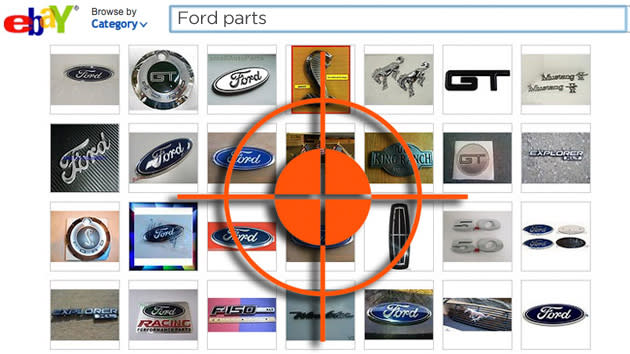 Motoramic
MotoramicExclusive: Ford wins secret bid for eBay and PayPal users’ data in lawsuit
Ford Motor Co. wants eBay and PayPal to turn over data on 13 users the automaker accuses of selling fake or unlicensed Ford parts on the online auction site, including names, addresses and bank accounts — and won a court order blocking eBay and PayPal from revealing Ford's demand to the users targeted.
The unusual move for an automaker contradicts the privacy policies at many large Internet companies and service providers which require notifying users whenever someone makes a legal request for their data. Privacy advocates have loudly fought efforts by law enforcement agencies to keep similar requests secret, and the rights Internet users have over personal data plays a key role in congressional battles over bills such as SOPA and CISPA. But the idea of a corporation gathering data while keeping its legal tracks covered has received far less attention.
Ford launched the bid in a lawsuit filed in January in the U.S. District Court in Detroit against "Does 1-13," anonymous people whom Ford accused of selling counterfeit or trademark-infringing parts on eBay. Ford didn't specify which auctions supposedly carried fake Ford badges, saying the goods included "radios, navigation systems, multimedia entertainment systems, air bags, side view mirrors, wheel covers, and other products." Under trademark law, Ford claims it could be entitled to $2 million in damages for every fake product sold.
U.S. District Court Judge George Steeh approved Ford's subpoenas to eBay and PayPal on March 5, telling eBay and PayPal to issue subpoenas to their users. But Ford quickly asked him to modify his order to ensure that eBay and PayPal would not tell their users about Ford's lawsuit and make Ford's case tougher to prove:
Ford respectfully suggests this procedure is impractical and would serve to undermine the rationale for the subpoenas. The procedure would impose a substantial burden on [eBay and PayPal] to prepare, serve and enforce subpoenas and would serve to "tip-off" or warn the Doe defendants of Ford's investigation. Under the procedure as written, the Does would have notice that Ford was seeking their identities and thus ample time to destroy evidence, the counterfeit and infringing goods, and flee to avoid service all before Ford would be entitled to receive their true identities.
Ford also broadened the information it sought from eBay from just names and addresses to include bank accounts and "all transactions by the account holder." On March 23, Judge Steeh denied Ford's request for bank account information, but allowed Ford to keep its subpoenas secret. Based on the timing of the orders, the subpoenas have likely been served to eBay, but there's no court record of eBay objecting to them, nor of any John Doe fighting the suit.
To get any further in its case, Ford will have to eventually amend its lawsuit to add real name and serve the suit on those people it accuses of wrongdoing. In a statement to Yahoo! Autos' Motoramic, Ford reiterated why it asked for secrecy: "Because this is an ongoing Ford legal case, informing the users about the information requests could compromise the investigation."
"...Informing the users about the information requests could compromise the investigation."
EBay, which owns PayPal, did not return a message seeking comment. The online auction site's policies don't clearly say whether it notifies users in civil cases; it does promise law enforcement agencies investigating crimes to keep their probes secret. Other large Internet firms typically disclose any civil subpoenas or pass them to users.
It's common for media companies to file lawsuits against scores of John and Jane Does for online copyright or trademark infringement, such as file-sharing movies, and then use the lawsuit to issue subpoenas and unmask the defendants. While there's no law requiring it, most major Internet firms have policies that require they notify a user if their data has been requested as part of a court case or a law enforcement probe — giving users a chance to fight the disclosure and know that they're being sued.
Art Neill, the executive director of privacy advocacy group New Media Rights, has helped defendants in several Doe cases accusing thousands of people of trademark infringement, and said in all those cases the Internet company involved notified users of subpoenas for their data.
"In none of those cases have I ever seen...where they ask to keep the subpoena secret," Neill said. In those cases, the suing companies "want the idea of the subpoena out there, because it lets the user know you're part of the suit," and more likely to settle quickly.
Much of the debate in recent months over online privacy has been spurred by bills in Congress, such as the Stop Online Piracy Act and a new bill, the Cyber Intelligence Sharing and Protection Act, which passed the U.S. House in April. CISPA would let companies and law enforcement agencies broadly share users' personal information to fight potential threats — including accusations of copyright violations and counterfeit goods — without penalty, trumping any company policy.
While SOPA was opposed by many Internet firms as overly broad, CISPA enjoys broader support among businesses. Privacy advocates contend both bills grant far too much power to government and businesses, an extension of their fight against tactics such as national security letters, a subpoena-like power from federal law enforcement agencies for Internet user data that — like Ford's subpoena — bars the user from being told about the request.
Ford's move "reminds me of the way the government handles national security letters," said Neil Richards, a law professor and privacy expert with Washington University in St. Louis. "Extending that to the realm of civil lawsuits is troubling."

 Yahoo Autos
Yahoo Autos 
